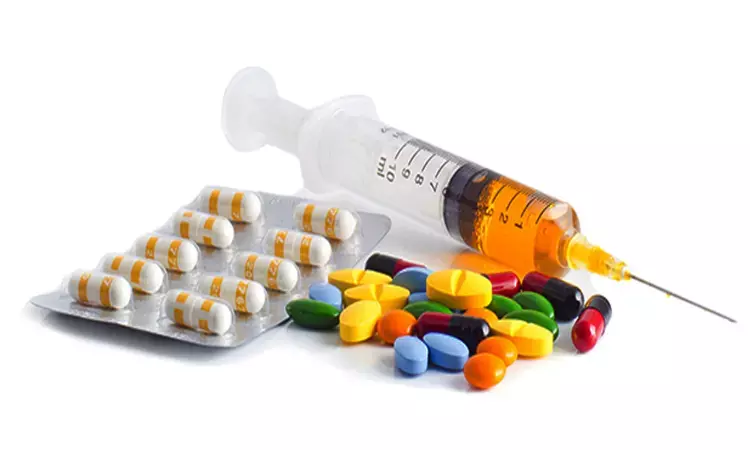- Home
- Medical news & Guidelines
- Anesthesiology
- Cardiology and CTVS
- Critical Care
- Dentistry
- Dermatology
- Diabetes and Endocrinology
- ENT
- Gastroenterology
- Medicine
- Nephrology
- Neurology
- Obstretics-Gynaecology
- Oncology
- Ophthalmology
- Orthopaedics
- Pediatrics-Neonatology
- Psychiatry
- Pulmonology
- Radiology
- Surgery
- Urology
- Laboratory Medicine
- Diet
- Nursing
- Paramedical
- Physiotherapy
- Health news
- Fact Check
- Bone Health Fact Check
- Brain Health Fact Check
- Cancer Related Fact Check
- Child Care Fact Check
- Dental and oral health fact check
- Diabetes and metabolic health fact check
- Diet and Nutrition Fact Check
- Eye and ENT Care Fact Check
- Fitness fact check
- Gut health fact check
- Heart health fact check
- Kidney health fact check
- Medical education fact check
- Men's health fact check
- Respiratory fact check
- Skin and hair care fact check
- Vaccine and Immunization fact check
- Women's health fact check
- AYUSH
- State News
- Andaman and Nicobar Islands
- Andhra Pradesh
- Arunachal Pradesh
- Assam
- Bihar
- Chandigarh
- Chattisgarh
- Dadra and Nagar Haveli
- Daman and Diu
- Delhi
- Goa
- Gujarat
- Haryana
- Himachal Pradesh
- Jammu & Kashmir
- Jharkhand
- Karnataka
- Kerala
- Ladakh
- Lakshadweep
- Madhya Pradesh
- Maharashtra
- Manipur
- Meghalaya
- Mizoram
- Nagaland
- Odisha
- Puducherry
- Punjab
- Rajasthan
- Sikkim
- Tamil Nadu
- Telangana
- Tripura
- Uttar Pradesh
- Uttrakhand
- West Bengal
- Medical Education
- Industry
Asthma patients being prescribed dangerous amounts of steroid tablets: Study

Researchers from Australia have found in a new study that more than one quarter of asthma patients have been prescribed potentially dangerous amounts of steroid tablets.This may put them at greater risk of serious side-effects, they warned.
The paper has been published in the Medical Journal of Australia.
Inhaled corticosteroids (ICS), through their anti-inflammatory effects have been the mainstay of treatment of asthma for many years. Systemic and ICS are also used in the treatment of acute asthma exacerbations.
Researchers, led by University of Queensland Professor John Upham, analysed data from the Pharmaceutical Benefits Scheme (PBS) to find out how often Australians with asthma were taking repeated courses of steroid tablets.
Professor Upham said the study looked at more than 120,000 cases where asthma patients were given one or more prescriptions for steroid tablets by their doctor between 2014 and 2018.
"Researchers found more than 25 per cent of those patients were more likely to have a chronic condition," Professor Upham said.
"Short courses of steroid tablets can be effective at treating asthma attacks in the short term, but it's becoming clear that repeated use may cause significant long term side-effects like diabetes, osteoporosis and cataracts.
Around 2.5 million Australians have asthma, with the condition affecting more women than men.
Professor Upham said the best way to prevent asthma attacks was by regularly using preventer inhalers.
"Unfortunately, our study found half of asthma patients given repeated scripts for steroid tablets were not using inhalers as often as they should," he said.
"Better approaches are needed to educate and support asthma patients, and encourage them use preventer inhalers regularly.
"This is the best way to avoid or minimise the need for steroid tablets, and the side effects they can produce."
Researchers from the Alfred Hospital (Melbourne), University of Newcastle, Monash University, Fiona Stanley Hospital (Perth), University of Sydney, Australian National University and Concord Hospital (Sydney) were involved in the study.
Dr Kamal Kant Kohli-MBBS, DTCD- a chest specialist with more than 30 years of practice and a flair for writing clinical articles, Dr Kamal Kant Kohli joined Medical Dialogues as a Chief Editor of Medical News. Besides writing articles, as an editor, he proofreads and verifies all the medical content published on Medical Dialogues including those coming from journals, studies,medical conferences,guidelines etc. Email: drkohli@medicaldialogues.in. Contact no. 011-43720751


